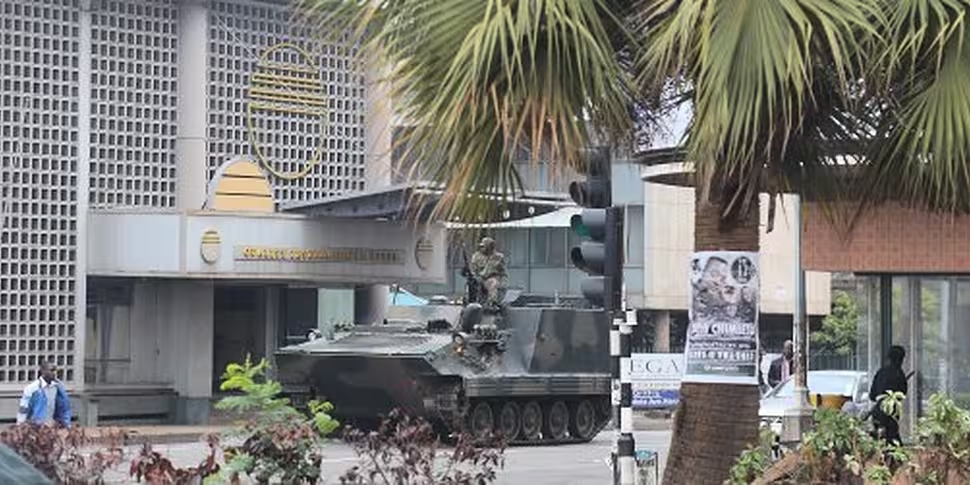Updated: 12.00
The Zimbabwean army has said president Robert Mugabe and his wife have been taken into custody after gunfire was heard near his compound and troops seized control of the state broadcaster.
However one report says his wife, Grace, has left the country for Namibia.
Loud explosions were heard in Harare in the early hours of Wednesday after military vehicles rolled into the capital, triggering speculation of a "bloodless" coup.
The blasts and gunfire came hours after a military chief warned the army could "step in" amid a political crisis sparked by 93-year-old Mr Mugabe firing his vice president - and likely successor - Emmerson Mnangagwa earlier this month.
The Irish embassy in Pretoria is advising Irish citizens to remain indoors, and to avoid areas where demonstrations may be taking place.
Due to the political uncertainty in Zimbabwe at this time we advise all Irish citizens to remain indoors and to avoid areas where demonstrations may be taking place. Please monitor this account for updates.
— IrishEmbassyPretoria (@IrlEmbPretoria) November 15, 2017
The US State Department has urged its citizens to shelter in place during the crisis.
While a spokesperson for the British Foreign Office said: "We advise any British national in Zimbabwe who may be concerned to monitor our travel advice for changes."
General Constantino Chiwenga, commmander of Zimbabwe's defence forces, had demanded an end to a purge in the ruling ZANU-PF party - which appeared to be paving the way for Mr Mugabe's 52-year-old wife Grace to succeed him.
In a statement read on state TV, Major General Sibusiso Moyo said: "Comrade Mugabe and his family are safe and sound and their security is guaranteed.
"We are only targeting criminals around him who are committing crimes that are causing social and economic suffering in the country, in order to bring them to justice."
The Zimbabwe military said on Wednesday that Mr Mugabe and his wife were in custody and it was securing government offices and patrolling the streets of Harare.
General Chiwenga - who Mr Mugabe had accused of treason for his intervention - said: "We wish to make it abundantly clear that this is not a military takeover of government.
"What the defence forces are doing is to pacify a degenerating political social and economic situation in our country, which if not addressed may result in a violent conflict."
Soldiers in armoured personnel carriers and tanks have been stationed at key locations in the capital, including government buildings.
The military has also taken control of a paramilitary police armoury and disarmed police officers there, Reuters reported.
It is unclear where Mr Mugabe was being held.
Supporters of the Zimbabwean military have insisted it is a "bloodless correction of gross abuse of power".
Chris Mutsvangwa, chairman of the war veterans' association, said the military will return Zimbabwe to "genuine democracy" and make it a "modern model nation".
Opposition leader Tendai Biti said a transitional authority is needed to secure a road map to democracy.
He said: "If it flaps like a duck, waggles like a duck, then it's a duck. This is a coup, there's no question about that.
"We condemn the extra-legal extraction of power from an elected civilian authority, but having said that we must acknowledge the deep structural underlying causes that would have led the army to do what they are doing now, whether it's pacification or whatever lipstick or mascara they might want to put on (it).
"This is Robert Mugabe's Waterloo and he must accept that. I pray the army do not harm him, I pray that they give him free passage if he wants to leave Zimbabwe."
South African President Jacob Zuma said he hoped the intervention would not lead to "unconstitutional changes of government".
Mr Mnangagwa (75), a veteran of the liberation wars, fled to South Africa after he was ousted on November 6th - with President Mugabe accusing him of plotting against the government.
Mr Mugabe is the only leader Zimbabwe has known in 37 years of independence.









